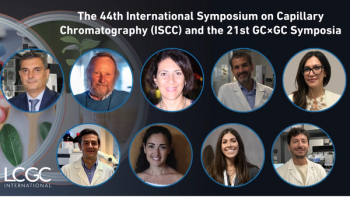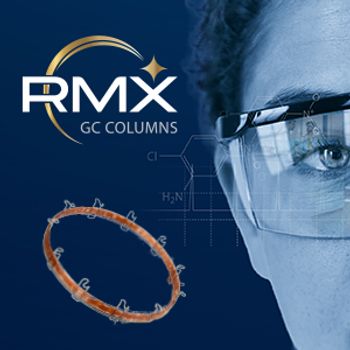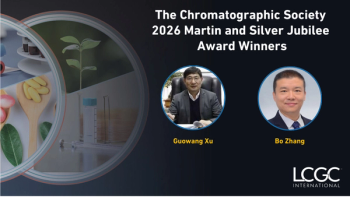
- LCGC Europe-03-01-2007
- Volume 20
- Issue 3
Current analytical research in Germany
Research group: Professor Jan Andersson, Institute of Inorganic and Analytical Chemistry, University of Münster, Münster.
Research group: Professor Jan Andersson, Institute of Inorganic and Analytical Chemistry, University of Münster, Münster.
Research focus: The core activity of the research group is the separation of complex samples. This involves using the most complex mixture known, namely petroleum, as a test case. The identification of individual components of such a mixture requires highly refined separation techniques. Lower boiling materials (gasoline, diesel) are simple and volatile enough to be analysed by gas chromatography (GC). Less volatile fractions, of great importance in industry, need multiple liquid chromatographic separations with mass spectral detection.
Central analytes are sulphur-containing aromatic compounds. The group develops normal-phase liquid chromatography (LC) phases for a multidimensional separation to narrow down the complexity of the mixture that contains compounds of a molar mass up to approximately 1000. Each chromatographic step separates the compounds according to a molecular characteristic so that the presence of a compound in a certain chromatographic fraction gives information about its structure. Even after a four-dimensional separation (four steps based on different separation mechanisms), an oil sample contains thousands of compounds. Fourier transform ion cyclotron resonance mass spectrometry (FT–ICR MS) allows for high-precision mass measurements that give the elemental composition.
Phenols in fuels are studied after a rapid and simple derivatization with ferrocene. The enormously sensitive atomic emission GC detector (iron emission) or the mass spectroscopy (MS) detector is used to give a high-resolution phenol-selective chromatogram.
Homepage:
E-mail:
Research group: Dr Frank Michael Matysik, Institute of Analytical Chemistry, University of Leipzig, Leipzig.
Research focus: The institute is involved in various activities in the field of separation science, including method developments and new applications in the field of capillary and chip-based electrophoresis with electrochemical detection, the development of novel detection systems for capillary electrophoresis; capillary electrophoresis in nonaqueous media; development of new approaches for sample injection into microfluidic systems/high-throughput analysis systems; applied studies in the fields of dye determinations, screening of illicit drugs, speciation analysis, determination of neuropeptides, electroplating processes, analysis of explosives and related compounds.
Dr Frank Michael Matysik works in close collaboration with Professor W. Engewald on method development and applied studies on selectivity enhancement using phase optimized liquid chromatography (POPLC).
Homeapge: http://
E-mail:
Research group: Ute Pyell, Department of Chemistry, Philipps-Universität, Marburg.
Research focus: In Ute Pyell's group at the Department of Chemistry highly efficient separation techniques employing electrokinetic effects, such as capillary electrophoresis (CE), electrokinetic chromatography (EKC), isotachophoresis (ITP) and capillary electrochromatography (CEC), are the focus of interest with the aim to develop strategies for rapid method optimization in the context of bioanalysis, forensic research, clinical analysis, food analysis and pharmaceutical analysis.
In combination with studies concerning sensitive and selective detection schemes [i.e., UV-laser-induced fluorescence detection (UV–LIFD), near-field thermal lens detection (NFTLD), electospray ionization mass spectroscopy (ESI–MS)] methods employing capillary electromigration separation techniques have been developed for the determination of constituents in a complex sample without any or with a minimum of sample preparation steps. The potential of on-line analyte enrichment and matrix removal techniques (for example via t-ITP) is also being investigated.
NFTLD in combination with a UV pump laser is studied as a detection method that can provide (in combination with CE capillaries) several orders of magnitude lower detection limits than traditional UV detection (depending on the thermooptical parameters of the separation medium and the photostability of the analyte). Work is in progress, in which novel synthetic routes (polymerization of cyclodextrin-acrylate host-guest complexes in aqueous media) in the preparation of organic monoliths (macroporous polymers, stationary phases for CEC) are investigated.
Homepage: http://
E-mail:
Research group: Professor Andreas Manz, The Institute for Analytical Sciences (ISAS), Dortmund and Berlin.
Research focus: ISAS is an independent research establishment with an annual budget of around €10 million and 150 people working at two locations in Dortmund and Berlin. It works on solving analytical problems and adopts an interdisciplinary approach to instruments and strategies.
The research at ISAS focuses on proteomics, metabolomics, material analysis, miniaturization and interface studies. There is particular interest in miniaturized analytical systems suitable for on-line applications, particularly microfluidics. Spectroscopy expertise ranges from specialized sample introduction techniques and complete echelle spectrographs for atomic absorption spectroscopy (AAS) to nano-Raman spectroscopic devices, which circumvents the limits of optical focusing.
Mass spectrometry (MS) is employed in combination with a variety of atomization and ionization techniques, including laser ablation with nanosecond and femtosecond pulses. Synchrotron radiation at dedicated beam-lines is used with x-ray fluorescence (XRF) microprobes and with infrared ellipsometry (IRSE) of molecular monolayers. The analytical scope of diode lasers is explored with, for example, surface-plasmon resonance (SPR) imaging, and ion mobility spectroscopy (IMS) has opened new avenues in medical applications.
Homepage: http://
E-mail:
Research group: Professor Thomas Welsch, Institute of Analytical and Environmental Chemistry, Ulm University, Ulm.
Research focus: The Institute of Analytical and Environmental Chemistry focuses on the development of highly efficient separation processes and their application on the analysis of multi-component mixtures of environmental and industrial concern. The group led by Professor Welsch is developing lab-made open tubular capillary separation systems in electroosmotic and pressure-driven mobile phase flow modes under different conditions to improve efficiency and overall performance.
Advanced instrumental concepts for sensitive UV-detection in micro- and nanoseparation systems complete this research. Another project concerns comprehensive two-dimensional high performance liquid chromatography (HPLC) for pharmaceutically or environmentally relevant compounds. It is based on studies of separation systems with orthogonal selectivities and on the use of small particle high-speed columns in the second dimension.
Further research areas include the synthesis and application of novel separation additives for counter pressure moderated micellar electrokinetic chromatography (MEKC) as a powerful tool for the separation of complex mixtures of explosives. In environmental analysis the group emphasizes new approaches for the analysis of algae toxins in the sediments of southern German lakes by novel extraction/enrichment techniques in combination with liquid chromatography–mass spectrometry (LC–MS).
Homepage: http://
E-mail:
Research group: Professor Klaus Albert, Eberhard-Karls University, Tübingen.
Research focus: Professor Klaus Albert's group at the Eberhard-Karls-University, Tübingen consists of two postdoctorates, six phD students, three undergraduates and four technical assistants and mainly focuses on two topics. On the one hand the group is synthesizing new stationary phases for use in HPLC and on the other, it is involved in the analysis of pharmacologically active plant components.
The synthetic section of the group is currently engaged in the development of new stationary phases that are highly suitable and effective for protein separation. Another synthetic topic is the immobilization of biomolecules, such as enzymes, on the surface of metal-oxide particles, because it has been shown that immobilized enzymes show a much higher activity than free ones. The analysis of the obtained particles of both the solid phases for HPLC and the immobilized enzymes, with solid state and suspension state nuclear magnetic resonance spectroscopy is equally important for the group. The analytical section of the group is working on the field of functional food, especially on carotenoids from various natural and artificial sources and on flavonoids from different types of tea, wine and fruit.
The group's special interest is in analysing metabolites, which have been shown to reveal antioxidative properties that might consequently be efficient in cancer prophylaxis. To accomplish those aims they are using up-to-date methods such as MSPD (matrix solid-phase extraction) for extraction, LC-MS(n), and hyphenation of capillary-HPLC and high-field nuclear magnetic resonance spectroscopy (capHPLC-NMR) for identification and structure elucidation.
Homepage:
E-mail:
Research group: Assistant Professor Thomas Letzel, The Analytical Research Group, Chair of Biopolymer Chemistry, Technische Universität, München, Munich.
Research focus: The research group currently consists of six people and the group's mission is to link various analytical approaches with technical advances in mass spectrometry (MS), thus leading to new and synergistic applications in the field of "functional proteomics". Recent topics have included "noncovalent complexes" and "metabolic pathways" focusing on fundamental mass spectrometric research of noncovalent interactions in the gas phase, the functions of proteins (enzymology) and the inhibition of known enzymes.
The team combines further analytical skills with biological, environmental, nutritional and pharmaceutical aspects, including automated liquid chromatography–mass spectrometry (LC–MS) applications for aerosol extracts, plant extracts, surface waters, red wine and others.
Homepage: http://
E-mail:
Research group: Professor Helmut E. Meyer, Medical Proteom-Center, Ruhr-University, Bochum.
Research focus: The Medical Proteome-Center (MPC) of the Ruhr-University Bochum is located in the prospering Ruhr Valley in the heart of middle Europe and is said to represent one of the leading institutes for protein analysis in the world. Originally founded by Professor Helmut E. Meyer in 1985 as the "Proteinstrukturlabor", the MPC has emerged as an innovative laboratory where a wide spectrum of modern proteomic technologies has been successfully established. More than 30 co-workers execute a multitude of different projects to enforce the effectiveness and sensitivity of proteomics technologies. United by these techniques, three different work units were established: brain proteomics (Professor Katrin Marcus), cancer proteomics (Dr Kai Stühler) and quantitative proteomics and mass spectrometry (Dr Bettina Warscheid). Besides numerous collaborations, both the German Human Brain Proteome Project (HBPP) and the HUPO HBPP (
The MPC is actively developing strategies for performing differential quantitative proteome analysis, thus steadily optimizing and developing new technologies, such as its current research into non-2D PAGE-based analysis.
The MPC offers a wide portfolio of technologies ranging from protein separation using multidimensional high performance liquid chromatography (HPLC) and 2D gel electrophoresis (GE) as well as protein identification via mass spectrometry with techniques such as nano liquid chromatography–electrospray ionization–mass spectrometry/mass spectrometry [nano LC–ESI–MS(/MS)], MALDI–MS and fourier transform ion cyclotron resonance–mass spectrometry (FT ICR–MS).
To handle the huge amount of data sets, one of the most powerful computer clusters in protein analysis named PAULA has been built up in Bochum. PAULA will be complemented with the implementation of the World Neuroproteome Database (WNPD).
Homepage:
E-mail:
Articles in this issue
almost 19 years ago
Setting Realistic Expectations for GC Optimizationalmost 19 years ago
Supercritical Fluid Chromatography (SFC): A Review of Technical Developmentsalmost 19 years ago
New Technologiesalmost 19 years ago
How Able Are You?almost 19 years ago
5th HIC/RPC Bioseparation Conferencealmost 19 years ago
Questions from IndiaNewsletter
Join the global community of analytical scientists who trust LCGC for insights on the latest techniques, trends, and expert solutions in chromatography.




